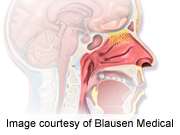Study compares treatment options for nose bleeds

(HealthDay)—Treatment for epistaxis is highly variable, with similar outcomes seen for embolization and arterial ligation, but increased costs with embolization, according to a study published online Oct. 17 in JAMA Otolaryngology-Head & Neck Surgery.
Jennifer A. Villwock, M.D., and Kristin Jones, M.D., from the State University of New York-Upstate Medical University in Syracuse, analyzed data from the 2008 to 2010 Nationwide Inpatient Sample for 57,039 patients admitted with a primary diagnosis of epistaxis. Demographic, management, and outcome trends were determined for those treated with conservative management, nasal packing, arterial ligation, or embolization.
The researchers found that 38.3 percent of patients were treated conservatively, while 53.3 percent received nasal packing or cauterization, 4.7 percent underwent arterial ligation, and 3.4 percent underwent embolization. Compared with nasal packing, the odds of stroke were significantly higher following embolization (odds ratio, 4.660; P = 0.003), but were not significantly different compared with surgical ligation (P = 0.70). The odds of mortality or blindness did not differ significantly between any of the study groups. The highest total hospital costs were seen for patients undergoing embolization, and were nearly double the cost of ligation (P < 0.001), but with no increase in the length of hospital stay (P = 0.20).
"Further prospective studies are needed to elucidate variables affecting outcomes of the various treatment options for epistaxis," the authors write.
More information:
Abstract
Full Text (subscription or payment may be required)
Copyright © 2013 HealthDay. All rights reserved.


















